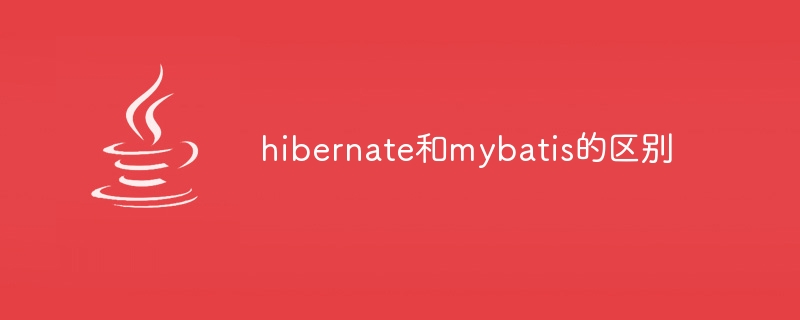Home >Java >javaTutorial >What are the differences between hibernate and mybatis
What are the differences between hibernate and mybatis
- 百草Original
- 2024-01-03 15:35:391278browse
The difference between hibernate and mybatis: 1. Implementation method; 2. Performance; 3. Comparison of object management; 4. Caching mechanism. Detailed introduction: 1. Implementation method, Hibernate is a complete object/relational mapping solution that maps objects to database tables, while MyBatis requires developers to manually write SQL statements and ResultMap; 2. Performance, Hibernate is possible in terms of development speed Faster than MyBatis because Hibernate simplifies the DAO layer and so on.

The operating system for this tutorial: Windows 10 system, DELL G3 computer.
Hibernate and MyBatis are two commonly used Java persistence layer frameworks. They have some differences in implementation, performance, scalability, etc. The following are the main differences between Hibernate and MyBatis:
1. Implementation method:
- Hibernate: is a complete object/relational mapping solution that converts objects into Map with database table. It simplifies the DAO layer, and developers do not need to worry about the writing and execution of SQL statements and result mapping. Hibernate automatically manages the state of objects, allowing developers to focus on business logic.
- MyBatis: Developers need to manually write SQL statements and ResultMap. MyBatis is simpler and feels more familiar to developers because it relies on SQL writing, similar to common JDBC/SQL persistence layer solutions.
2. Performance:
- Hibernate: It may be faster than MyBatis in terms of development speed because Hibernate simplifies the DAO layer so that developers can Focus on business logic. However, Hibernate's query will query all fields in the table, which may have an impact on performance. In addition, Hibernate also provides log statistics functions.
- MyBatis: Since all SQL is written in dependence on the database, the scalability and migration are relatively poor. However, MyBatis allows developers to specify query fields as needed, allowing for more detailed SQL optimization, reducing query fields and improving efficiency.
3. Comparison of object management:
- Hibernate: has a complete object/relational mapping solution and provides object state management functions. Developers do not need to worry about the details of SQL execution, because Hibernate will take care of these details.
- MyBatis: There is no documentation in this area, and users need to manage the objects themselves in detail.
4. Caching mechanism:
- Hibernate: Provides first-level cache and second-level cache mechanisms. The first-level cache is the Session cache, and the second-level cache is the SessionFactory-level cache. Hibernate's cache is divided into built-in cache and external cache. The built-in cache stores data contained in some collection attributes of the SessionFactory object (mapping element data and predetermined SQL statements, etc.), which is read-only for applications. The external cache stores a copy of the database data, and its function is similar to the first-level cache. In addition to using memory as the storage medium, the second-level cache can also use external storage devices such as hard disks.
- MyBatis: Since all SQL is written in dependence on the database, the scalability and migration are relatively poor. But MyBatis also provides a simple caching mechanism. In addition to using the system's default caching mechanism, the second-level cache using MyBatis can also completely override the caching behavior by implementing a custom cache or creating an adapter for other third-party caching solutions.
To sum up, Hibernate and MyBatis are both excellent persistence layer frameworks, each with different advantages and characteristics. Which framework to choose mainly depends on the actual needs of the project and the familiarity of the development team.
The above is the detailed content of What are the differences between hibernate and mybatis. For more information, please follow other related articles on the PHP Chinese website!
Related articles
See more- Detailed explanation of setting configuration examples in java mybatis
- MyBatis openSession(), close(), and commit() usage explanation
- How to dynamically replace table names in spring hibernate in Java
- Examples of mybatis using Java8 dates LocalDate and LocalDateTime
- The basic working principle of mybatis

